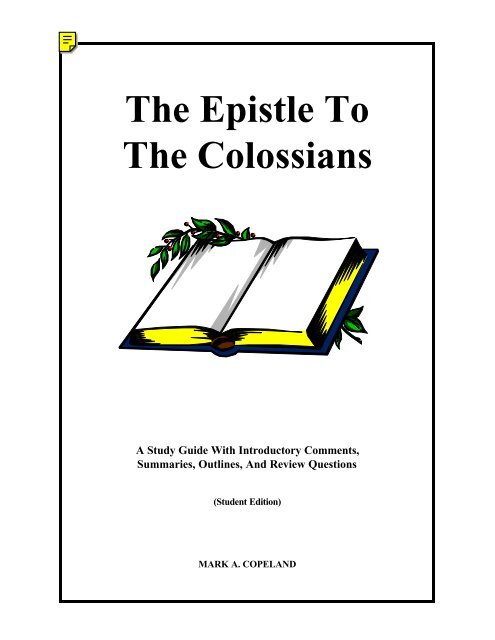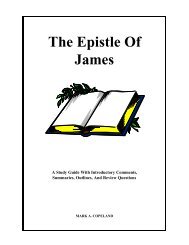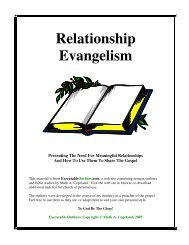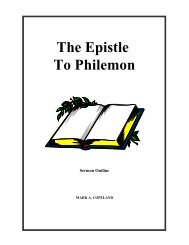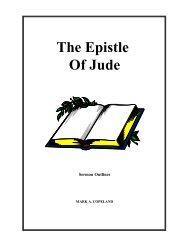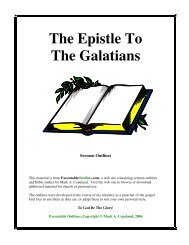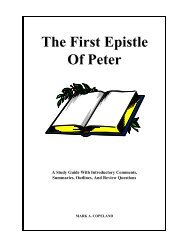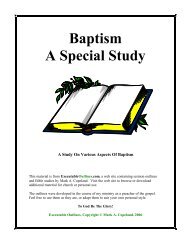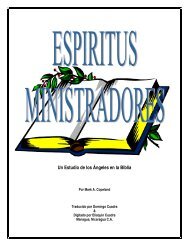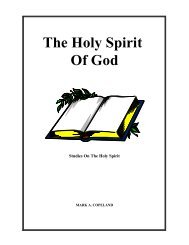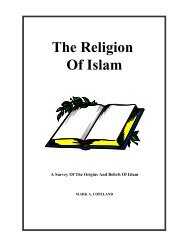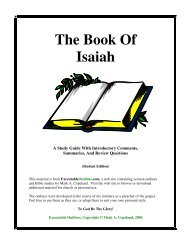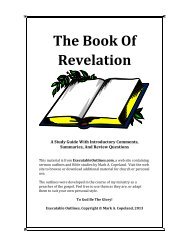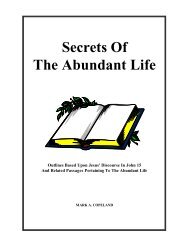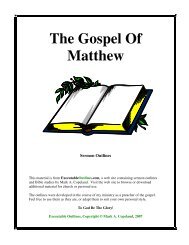The Epistle To The Colossians - Executable Outlines
The Epistle To The Colossians - Executable Outlines
The Epistle To The Colossians - Executable Outlines
You also want an ePaper? Increase the reach of your titles
YUMPU automatically turns print PDFs into web optimized ePapers that Google loves.
<strong>The</strong> <strong>Epistle</strong> <strong>To</strong><br />
<strong>The</strong> <strong>Colossians</strong><br />
A Study Guide With Introductory Comments,<br />
Summaries, <strong>Outlines</strong>, And Review Questions<br />
(Student Edition)<br />
MARK A. COPELAND
<strong>The</strong> <strong>Epistle</strong> <strong>To</strong> <strong>The</strong> <strong>Colossians</strong><br />
Table Of Contents<br />
Introduction 3<br />
Chapter One 9<br />
Chapter Two 13<br />
Chapter Three 17<br />
Chapter Four 21<br />
This material is from <strong>Executable</strong><strong>Outlines</strong>.com, a web site containing sermon outlines<br />
and Bible studies by Mark A. Copeland. Visit the web site to browse or download<br />
additional material for church or personal use.<br />
<strong>The</strong> outlines were developed in the course of my ministry as a preacher of the gospel.<br />
Feel free to use them as they are, or adapt them to suit your own personal style. <strong>To</strong><br />
God be the glory!<br />
<strong>Executable</strong> <strong>Outlines</strong>, Copyright © Mark A. Copeland, 2002<br />
MarkCopeland@aol.com<br />
Mark A. Copeland<br />
<strong>The</strong> Book Of <strong>Colossians</strong> 2
AUTHOR<br />
<strong>The</strong> <strong>Epistle</strong> <strong>To</strong> <strong>The</strong> <strong>Colossians</strong><br />
Introduction<br />
<strong>The</strong> apostle Paul, joined in his salutation by Timothy (1:1), and signed by Paul himself at the end of the<br />
letter (4:18). Early sources in church history that attribute this letter to Paul include: Eusebius (300<br />
A.D.), Origen (250 A.D.), Clement of Alexandria (200 A.D.), Tertullian (200 A.D.), Irenaeus (200<br />
A.D.), and the Muratorian Fragment (180 A.D.).<br />
THE CITY OF COLOSSE<br />
<strong>The</strong> city was located about 100 miles east of Ephesus in Asia Minor (modern day Turkey). <strong>To</strong>gether<br />
with Hieropolis (4:13) and Laodicea (2:1; 4:13-16; Re 3:14-22), Colosse made up a tri-city area.<br />
Each city had its own distinction:<br />
Hierapolis, a place for health, pleasure, and relaxation<br />
Laodicea, known for its commercial trade and politics<br />
Colosse, known simply as a small town<br />
Colosse was mostly a pagan city, with a strong intermingling of Jews (in 62 B.C., there were 11,000<br />
Jewish freemen in the tri-city area). This may explain the nature of some of the problems that arose<br />
among the church in Colosse (problems with both pagan and Jewish origin).<br />
THE CHURCH AT COLOSSE<br />
Mark A. Copeland<br />
<strong>The</strong> establishment of the church is uncertain. At issue is whether Paul himself had ever been there.<br />
Some suggest that Paul may have done some work there during his third journey, on the way to<br />
Ephesus (cf. Ac 18:23; 19:1). Others point out that Paul's comments imply that he had not personally<br />
been in Colosse (cf. 2:1). One possibility is that the church was established during Paul's extended stay<br />
at Ephesus, where the effect of his work spread throughout Asia Minor (cf. Ac 19:8-10). It may not<br />
have been Paul himself, but one of his coworkers who went out to Colosse. Paul's remarks in the<br />
epistle indicate that Epaphras was the one who preached the gospel there (1:5-8) and in Hierapolis and<br />
Laodicea (4:12-13). Though he was with Paul at the time the epistle was written, Epaphras is identified<br />
as "one of you" (4:12), suggesting that he may have originally been from Colosse.<br />
Other members of the church at Colosse included Philemon, Apphia, and Archippus, who may have<br />
been father, mother, and son. By comparing the epistle to the <strong>Colossians</strong> with that written to Philemon,<br />
it is reasonable to suppose that the church at Colosse met in their home (cf. 4:17 with Phile 1-2, and<br />
the references to Archippus). If Philemon and his family were hosts of the church at Colosse, then<br />
<strong>The</strong> Book Of <strong>Colossians</strong> 3
Onesimus (Philemon's slave) would have also been a member there upon his return (cf. 4:7-9 with Phile<br />
8-16).<br />
TIME AND PLACE OF WRITING<br />
<strong>Colossians</strong> is one of Paul's four "prison epistles" (4:18; cf. Ephesians, Philippians, and Philemon). <strong>The</strong><br />
general consensus is that these epistles were written during Paul's imprisonment at Rome (cf. Ac 28:16,<br />
30-31). If such is truly the case, then Paul wrote <strong>Colossians</strong> around 61-63 A.D. from Rome. <strong>The</strong><br />
indication is that the epistles to the <strong>Colossians</strong>, Philemon and the Ephesians were carried to their<br />
destination by Tychicus and Onesimus (cf. 4:7-9; Phile 10-12; Ep 6:21-22).<br />
PURPOSE OF THE EPISTLE<br />
Paul had received a report of the situation at Colosse by way of Epaphras (1:7-8). This report was for<br />
the most part favorable (2:5). But the subject matter in the epistle strongly suggests that the church was<br />
facing a twofold danger:<br />
<strong>The</strong> danger of relapse into paganism with its gross immorality (cf. 1:21-23; 2:6;<br />
3:5-11)<br />
<strong>The</strong> danger of accepting what has been come to known as "<strong>The</strong> Colossian<br />
heresy". This heresy was a syncretism involving four elements of both pagan and<br />
Jewish origin:<br />
Philosophies of men - which denied the all sufficiency and preeminence of<br />
Christ (2:8)<br />
Judaistic ceremonialism - which attached special significance to the rite of<br />
circumcision, food regulations, and observance of special days (2:11,16-17)<br />
Angel worship - which detracted from the uniqueness of Christ (2:18)<br />
Asceticism - which called for harsh treatment of the body as the means to<br />
control its lusts (2:20-23)<br />
<strong>To</strong> guard against these dangers, Paul writes to:<br />
Warn the <strong>Colossians</strong> against relapse (1:21-23)<br />
Warn them against the "solution" being urged upon them by those denying the<br />
all-sufficiency of Christ (2:8-23)<br />
Direct their attention to the "Beloved Son", the "All-Sufficient and Preeminent<br />
Savior" (1:13-18; 2:8-10)<br />
Mark A. Copeland<br />
<strong>The</strong> Book Of <strong>Colossians</strong> 4
THEME OF THE EPISTLE<br />
With the focus on Jesus Christ as the answer to "<strong>The</strong> Colossian heresy", the theme of this letter is<br />
clearly:<br />
CHRIST - THE FULNESS OF GOD,<br />
AND THE PREEMINENT, ALL-SUFFICIENT SAVIOR<br />
KEY VERSES: <strong>Colossians</strong> 2:9-10<br />
OUTLINE<br />
"For in Him dwells all the fullness of the Godhead bodily; and you are<br />
complete in Him, who is the head of all principality and power."<br />
INTRODUCTION (1:1-14)<br />
1. Salutation (1-2)<br />
2. Thanksgiving and prayer (3-14)<br />
I. THE PREEMINENCE OF CHRIST (1:15-23)<br />
A. IN CREATION (1:15-17)<br />
1. <strong>The</strong> image of the invisible God (1:15a)<br />
2. <strong>The</strong> first-born over all creation (1:15b-17)<br />
B. IN REDEMPTION (1:18-23)<br />
1. <strong>The</strong> head of the body, the church (1:18a)<br />
2. <strong>The</strong> beginning, the first-born from the dead (1:18b)<br />
3. That He might have preeminence in all things (1:18c)<br />
a. In Whom all the fullness dwells (1:19)<br />
b. In Whom all things are to be reconciled to God (1:20)<br />
c. <strong>The</strong> <strong>Colossians</strong> as a case in point (1:21-23)<br />
II. THE APOSTLE OF CHRIST (1:24-2:7)<br />
A. PAUL'S SERVICE (1:24-29)<br />
1. His joy in suffering for them (1:24)<br />
2. His ministry (1:25-29)<br />
a. A stewardship to proclaim the mystery of God now revealed (1:25-27)<br />
b. A labor to present every man perfect in Christ Jesus (1:28-29)<br />
B. PAUL'S SOLICITUDE (2:1-7)<br />
1. His great concern for them (2:1-3)<br />
2. Reasons for this concern (2:4-5)<br />
3. Exhortations to be firmly established in Christ (2:6-7)<br />
Mark A. Copeland<br />
<strong>The</strong> Book Of <strong>Colossians</strong> 5
III.WARNINGS AGAINST "THE COLOSSIAN HERESY" (2:8-23)<br />
A. WARNING AGAINST PHILOSOPHY (2:8-10)<br />
1. Beware of being cheated by philosophy and empty deceit (2:8)<br />
2. In Christ dwells the fullness of God, and you are complete in Him (2:9-10)<br />
B. WARNING AGAINST JUDAISTIC CEREMONIALISM (2:11-17)<br />
1. In Christ you have a circumcision made without hands (2:11-12)<br />
2. You are made alive in Christ, and the handwriting of requirements that was against us has<br />
been taken away at the cross (2:13-15)<br />
3. <strong>The</strong>refore don't let anyone judge you in regards to food, festivals, or Sabbath days<br />
(2:16-17)<br />
C. WARNING AGAINST ANGEL WORSHIP (2:18-19)<br />
1. Don't let anyone defraud you of your reward by appealing to angel worship and imagined<br />
visions of a fleshly mind (2:18)<br />
2. Such people do not hold fast to Christ as the Head, and from whom true divine nourishment<br />
comes (2:19)<br />
D. WARNING AGAINST ASCETICISM (2:20-23)<br />
1. Having died with Christ to the world, there is no need to submit to human ordinances<br />
(2:20-22)<br />
2. While having appearances of wisdom, such practices have no value in controlling the<br />
indulgences of the flesh (2:23)<br />
IV. THE CHRISTIAN SOLUTION (3:1-4:6)<br />
A. SET YOUR MIND ON THINGS ABOVE (3:1-4)<br />
1. Since you were raised with Christ, seek those things above (3:1-2)<br />
2. For you have died and your life is now hidden in Christ, to be revealed when He appears<br />
(3:3-4)<br />
B. PUT OFF THE OLD MAN (3:5-9)<br />
1. Put to death your members here on the earth, for the wrath of God is coming on the sons of<br />
disobedience (3:5-7)<br />
2. Put off the old man with his deeds (3:8-9)<br />
C. PUT ON THE NEW MAN (3:10-17)<br />
1. Put on the new man, renewed in the image of our Creator (3:10-11)<br />
2. As God's elect, put on Christ-like qualities (3:12-14)<br />
3. Let God's peace rule in your hearts, and be thankful (3:15)<br />
4. Let the word of Christ dwell in you richly, teaching and admonishing one another with song<br />
and singing with grace in your hearts (3:16)<br />
5. Do all things in the name of the Lord Jesus, with thanksgiving (3:17)<br />
D. FAMILIAL RESPONSIBILITIES (3:18-4:1)<br />
Mark A. Copeland<br />
<strong>The</strong> Book Of <strong>Colossians</strong> 6
1. Wives toward their husbands (3:18)<br />
2. Husbands toward their wives (3:19)<br />
3. Children toward their parents (3:20)<br />
4. Fathers toward their children (3:21)<br />
5. Servants toward their masters (3:22-25)<br />
6. Masters toward their servants (4:1)<br />
E. EXHORTATIONS TO PRAYER AND PROPER CONDUCT (4:2-6)<br />
1. Devote yourselves to prayer (4:2-4)<br />
2. Walk in wisdom and let your speech be with grace (4:5-6)<br />
V. PAUL'S COMPANIONS (4:7-14)<br />
A. COMMENDATIONS OF HIS MESSENGERS (4:7-9)<br />
1. Tychicus, a faithful servant who will inform them of Paul's circumstances (4:7-8)<br />
2. Onesimus, a faithful and beloved brother (4:9)<br />
B. GREETINGS FROM HIS FRIENDS (4:10-14)<br />
1. Aristarchus, Mark, and Justus, fellow workers for the kingdom of God (4:10-11)<br />
2. Epaphras, one of them, and a servant of Christ (4:12-13)<br />
3. Luke the beloved physician, and Demas (4:14)<br />
CONCLUSION (4:15-18)<br />
1. Greetings to those in Laodicea, and to Nymphas and the church in his house (4:15)<br />
2. A command to read and exchange the epistles from Paul (4:16)<br />
3. A personal exhortation to Archippus (4:17)<br />
4. A personal signoff from the hand of Paul, with a request for remembrance and a prayer in their<br />
behalf (4:18)<br />
REVIEW QUESTIONS FOR THE INTRODUCTION<br />
1) Who had taught the <strong>Colossians</strong> the truth concerning God's grace? (Co 1:6-7)<br />
2) From where and when did Paul write <strong>Colossians</strong>?<br />
3) What three other epistles were written about this time? What are the four epistles<br />
sometimes called?<br />
3) What two potential dangers prompted the writing of this epistle?<br />
Mark A. Copeland<br />
<strong>The</strong> Book Of <strong>Colossians</strong> 7
4) What four elements make up the "Colossian Heresy"?<br />
5) What is the "theme" of this epistle?<br />
6) What serves as the "key verses" of this epistle?<br />
Mark A. Copeland<br />
7) According to the outline above, what are the five main subject divisions in this epistle?<br />
<strong>The</strong> Book Of <strong>Colossians</strong> 8
<strong>The</strong> <strong>Epistle</strong> <strong>To</strong> <strong>The</strong> <strong>Colossians</strong><br />
Chapter One<br />
OBJECTIVES IN STUDYING THIS CHAPTER<br />
1) <strong>To</strong> see the relationship between understanding the grace of God and bearing fruit<br />
2) <strong>To</strong> examine Paul's prayer for the <strong>Colossians</strong> for the keys to successful Christian living<br />
3) <strong>To</strong> appreciate the preeminence of Christ in creation and our redemption<br />
SUMMARY<br />
Paul begins with his customary salutation followed by an expression of thanksgiving and prayer. Hearing<br />
of their condition from Epaphras, he is thankful for their faith, love, and hope (1-8). His prayer is that<br />
they be filled with the knowledge of God's will, walk in a manner worthy of the Lord, strengthened by<br />
God's glorious power, and ever thankful that the Father has qualified them to be partakers of the saints'<br />
inheritance. Especially since they were delivered from the power of darkness and translated into the<br />
kingdom of God's dear Son, where there is redemption and forgiveness of sins (9-14).<br />
He then broaches the theme of this epistle, which is the preeminence and all-sufficiency of Jesus Christ<br />
our Savior. Paul first proclaims the preeminence of Christ in creation, and then His preeminence in<br />
redemption (15-20). <strong>The</strong> <strong>Colossians</strong>' own conversion is offered as a case in point in reference to the<br />
latter, and with a warning for them to remain steadfast (21-23).<br />
<strong>The</strong> chapter ends with Paul's description of his ministry, in which he gladly suffered on behalf of Christ<br />
and His church. He views himself as a steward entrusted with a wonderful "mystery", which is being<br />
made known after having been hidden for ages. This "mystery" pertains to the Gentiles, and how Christ<br />
would be in them (24-27). Paul therefore worked diligently to preach Christ, with the goal of presenting<br />
every man perfect in Him (28-29).<br />
OUTLINE<br />
I. INTRODUCTION (1-14)<br />
A. SALUTATION (1-2)<br />
1. From Paul, an apostle of Jesus Christ by the will of God (1a)<br />
2. And Timothy, "our brother" (1b)<br />
3. <strong>To</strong> the saints and faithful brethren in Christ, who are in Colosse (2a)<br />
4. Grace and peace from God and Jesus Christ (2b)<br />
B. PAUL'S THANKSGIVING AND PRAYER (3-14)<br />
1. His thanksgiving for them (3-8)<br />
Mark A. Copeland<br />
<strong>The</strong> Book Of <strong>Colossians</strong> 9
a. Given to God, with unceasing prayers in their behalf (3)<br />
b. Given since he heard of:<br />
1) <strong>The</strong>ir faith in Christ Jesus (4a)<br />
2) <strong>The</strong>ir love for all the saints (4b)<br />
c. Given because the hope laid up for them in heaven (5)<br />
1) Which they had heard by way of the gospel<br />
a) Which had come to them as to all the world, bringing forth fruit (6a)<br />
b) Even in them, since the day they heard and knew the grace of God (6b)<br />
2) Which they had heard by way of Epaphras<br />
a) A dear fellow servant and faithful minister of Christ on their behalf (7)<br />
b) Who declared to Paul their love in the Spirit (8)<br />
2. His prayer for them (9-14)<br />
a. Offered unceasingly since he heard of their progress (9a)<br />
b. Asking that they might...<br />
1) Be filled with the knowledge of God's will in wisdom and spiritual understanding<br />
(9b)<br />
2) Walk worthy of the Lord, fully pleasing Him (10a)<br />
a) Being fruitful in every good work (10b)<br />
b) Increasing in the knowledge of God (10c)<br />
3) Be strengthened with all might (11a)<br />
a) According to His glorious power (11b)<br />
b) For all patience and longsuffering with joy (11c)<br />
4) Give thanks to the Father (12a)<br />
a) Who qualified us to be partakers of the saints' inheritance (12b)<br />
b) Who has delivered us from the power of darkness (13a)<br />
c) Who has translated us into the kingdom of His dear Son (13b)<br />
1/ In whom we have redemption through His blood (14a)<br />
2/ In whom we have forgiveness of sins (14b)<br />
II. THE PREEMINENCE OF CHRIST (15-23)<br />
A. IN CREATION (15-17)<br />
1. He is the image of the invisible God (15a)<br />
2. He is the firstborn over all creation (15b)<br />
3. All things were created by Him (16)<br />
4. He is before all things (17a)<br />
5. In Him all things consist (17b)<br />
Mark A. Copeland<br />
B. IN REDEMPTION (18-23)<br />
1. He is the head of the body, the church (18a)<br />
2. He is the beginning, the firstborn from the dead (18b)<br />
3. That He might have the preeminence in all things (18c)<br />
4. It pleased the Father...<br />
a. That in Him all the fullness should dwell (19)<br />
b. That by Him all things were to be reconciled to Himself, making peace through the<br />
blood of the cross (20)<br />
<strong>The</strong> Book Of <strong>Colossians</strong> 10
5. <strong>The</strong> <strong>Colossians</strong> as a case in point (21-23)<br />
a. <strong>The</strong>y were once alienated and enemies in mind, through wicked works (21a)<br />
b. Yet now reconciled...<br />
1) In the body of His flesh through death (21b-22a)<br />
2) <strong>To</strong> be presented holy, blameless, and irreproachable in His sight (22b)<br />
3) If they continue in the faith...<br />
a) Grounded and steadfast (23a)<br />
b) Not moved away from the gospel<br />
1/ Which they heard (23b)<br />
2/ Which was preached to every creature under heaven (23c)<br />
3/ Of which Paul became a minister (23d)<br />
III.THE APOSTLE OF CHRIST (24-29)<br />
A. HIS JOY (24)<br />
1. In suffering for their sake (24a)<br />
2. For in his flesh he fills up what is lacking in the afflictions of Christ (24b)<br />
3. All is done for the sake of His body, the church (24c)<br />
B. HIS MINISTRY (25-29)<br />
1. Made a minister according to the stewardship from God (25a)<br />
a. Given to him for them (25b)<br />
b. <strong>To</strong> fulfill the word of God (25c)<br />
1) <strong>The</strong> mystery which has been hidden for ages and generations (26a)<br />
2) But now has been revealed to His saints (26b)<br />
a) <strong>To</strong> whom God willed to make known the riches of the glorious mystery among<br />
the Gentiles (27a)<br />
b) Which is Christ in them, the hope of glory (27b)<br />
2. Proclaiming Christ (28-29)<br />
a. By warning and teaching every man in all wisdom (28a)<br />
b. That he might present every man perfect in Christ (28b)<br />
1) Laboring toward this end (29a)<br />
2) Striving according to His working which works in him mightily (29b)<br />
REVIEW QUESTIONS FOR THE CHAPTER<br />
1) What are the main points of this chapter?<br />
2) Who joins Paul in the salutation of this epistle? (1)<br />
Mark A. Copeland<br />
<strong>The</strong> Book Of <strong>Colossians</strong> 11
3) What three things had Paul heard about the <strong>Colossians</strong>, for which he gave thanks? (3-5)<br />
4) How long had the gospel been bringing forth fruit in their lives? (6)<br />
5) Who had informed Paul of their condition? (8)<br />
6) List four things for which Paul prayed concerning the <strong>Colossians</strong> (9-11)<br />
7) Into what have we been translated? (13)<br />
8) What does one enjoy in Christ? (14)<br />
9) List five things which illustrate Christ's preeminence in creation (15-17)<br />
10) List four things which illustrate Christ's preeminence in redemption (18-20)<br />
11) What was the former condition of the <strong>Colossians</strong>? How were they changed? (21-22)<br />
12) Upon what condition would they be presented holy, blameless and irreproachable? (22-23)<br />
13) What is said about the "mystery" which has been hidden? (26)<br />
14) What is the glorious nature of this "mystery"? (27)<br />
15) What was Paul's goal in preaching Christ? (28)<br />
Mark A. Copeland<br />
<strong>The</strong> Book Of <strong>Colossians</strong> 12
<strong>The</strong> <strong>Epistle</strong> <strong>To</strong> <strong>The</strong> <strong>Colossians</strong><br />
Chapter Two<br />
OBJECTIVES IN STUDYING THIS CHAPTER<br />
1) <strong>To</strong> see the relation between understanding the "mystery of God" and having a strong assurance of<br />
our salvation<br />
2) <strong>To</strong> appreciate how baptism serves as our spiritual circumcision, and that it is a work of God which<br />
is performed, not a work of man<br />
3) <strong>To</strong> understand how Christ brought an end to the Old Law by His death on the cross<br />
SUMMARY<br />
Paul reveals his great concern for those at Colosse and others he has not seen, expressing his desire that<br />
their hearts be knit together in love, and that they may have the assurance that comes from an<br />
understanding of the mystery of God as revealed through Christ. He rejoices in their good order and<br />
steadfastness, and encourages them to be firmly established in Christ, abounding in thanksgiving (1-7).<br />
<strong>The</strong> word "Beware" in verse eight summarizes the rest of the chapter, in which Paul warns them of the<br />
dangers of "<strong>The</strong> Colossian Heresy". <strong>The</strong>se dangers include being cheated through philosophy and vain<br />
deceit, and defrauded of their reward by those who appeal to false humility, the worship of angels, false<br />
visions, and strict regulations according to the commandments and doctrines of men which really have<br />
no value against the indulgence of the flesh. In Christ they are made complete, having undergone a<br />
circumcision not made with hands, in which God made them alive together with Christ. Since Christ has<br />
also nailed to the cross the "handwriting of requirements" that was against them and taken it out of the<br />
way, none can judge them regarding religious observances that were only a shadow pointing to the true<br />
substance of Christ (8-23).<br />
OUTLINE<br />
I. PAUL'S SOLICITUDE (1-7)<br />
A. HIS GREAT CONCERN FOR THEM (1-3)<br />
1. He has a great conflict for those...<br />
a. In Colosse and Laodicea (1a)<br />
b. Who have not seen his face in the flesh (1b)<br />
2. His desire is that...<br />
a. <strong>The</strong>ir hearts be encouraged, knit together in love (2a)<br />
b. <strong>The</strong>y attain to all the riches of:<br />
1) <strong>The</strong> full assurance of understanding (2b)<br />
2) <strong>The</strong> knowledge of the mystery of God (2c)<br />
Mark A. Copeland<br />
<strong>The</strong> Book Of <strong>Colossians</strong> 13
a) Both of the Father and of Christ (2d)<br />
b) In whom are hidden all the treasures of wisdom and knowledge (3)<br />
B. REASONS FOR THIS CONCERN (4-5)<br />
1. Lest anyone deceive them with persuasive words (4)<br />
2. Though absent in the flesh, he is present with them in spirit (5a)<br />
3. He rejoices to see...<br />
a. <strong>The</strong>ir good order (5b)<br />
b. <strong>The</strong> steadfastness of their faith (5c)<br />
C. EXHORTATIONS TO BE FIRMLY ESTABLISHED IN CHRIST (6-7)<br />
1. As they have received Christ, so they should walk in Him (6)<br />
a. Rooted and built up in Him (7a)<br />
b. Established in the faith (7b)<br />
-- As they were taught (7c)<br />
2. Abounding with thanksgiving (7d)<br />
II. WARNINGS AGAINST "THE COLOSSIAN HERESY" (8-23)<br />
A. WARNING AGAINST PHILOSOPHY (8-10)<br />
1. Beware of being cheated by philosophy and empty deceit (8a)<br />
a. According to the traditions of men (8b)<br />
b. According to the basic principles of the world (8c)<br />
-- And not according to Christ (8d)<br />
2. In Christ dwells the fullness of God, and you are complete in Him (9-10)<br />
a. All the fullness of the Godhead dwells bodily in Christ (9)<br />
b. You are complete in Him, who is head over all principality and power (10)<br />
Mark A. Copeland<br />
B. WARNING AGAINST JUDAISTIC CEREMONIALISM (11-17)<br />
1. In Christ you have a circumcision made without hands (11-12)<br />
a. A putting off of the body of the sins of the flesh (11)<br />
b. Having been buried with Christ in baptism (12)<br />
1) In which you were also raised with Him (12a)<br />
2) Through faith in the working of God, who raised Jesus from the dead (12b)<br />
2. You are made alive in Christ, and the handwriting of requirements that was against us has<br />
been taken away at the cross (13-15)<br />
a. Dead in sins and the uncircumcision of your flesh, God has made you alive (13a)<br />
b. He has forgiven you all trespasses (13b)<br />
c. He has wiped out the handwriting of requirements that was against us (14)<br />
1) That which was contrary to us (14a)<br />
2) He has taken it out of the way, having nailed it to the cross (14b)<br />
d. He has disarmed principalities and powers (15)<br />
1) Having made a public spectacle of them (15a)<br />
2) Triumphing over them in it (15b)<br />
3. <strong>The</strong>refore don't let anyone judge you in regards to food, festivals, or Sabbath days (16)<br />
a. <strong>The</strong>y are only a shadow of things to come (17a)<br />
<strong>The</strong> Book Of <strong>Colossians</strong> 14
. <strong>The</strong> substance is of Christ (17b)<br />
C. WARNING AGAINST ANGEL WORSHIP (18-19)<br />
1. Don't let anyone defraud you of your reward (18a)<br />
a. By taking delight in false humility and worship of angels (18b)<br />
b. By intruding into things not seen, vainly puffed by fleshly minds (18c)<br />
2. Such people do not hold fast to Christ as the Head (19a)<br />
a. From whom all the body grows (19b)<br />
b. Nourished and knit together by various elements, with increase from God (19c)<br />
D. WARNING AGAINST ASCETICISM (2:20-23)<br />
1. <strong>The</strong>re is no need to submit to human ordinances (2:20-22)<br />
a. For you have died with Christ from basic principles of the world (20a)<br />
b. <strong>The</strong>refore do not subject yourselves to ascetic regulations (20b)<br />
1) Such as "Do not touch, do not taste, do not handle" (21)<br />
2) <strong>The</strong>y only concern things which perish with the using (22a)<br />
3) Which are according to commandments and doctrines of men (23)<br />
2. Such practices are of no value (23)<br />
a. <strong>The</strong>y may have an appearance of wisdom in their...<br />
1) Self-imposed religion (23a)<br />
2) False humility (23b)<br />
3) Neglect of the body (23c)<br />
b. But they are no value against the indulgence of the flesh (23d)<br />
REVIEW QUESTIONS FOR THE CHAPTER<br />
1) What are the main points of this chapter?<br />
2) What was Paul's strong desire for those he had not seen? (1-2)<br />
3) What is "hidden" in Christ? (3)<br />
4) What had Paul seen in the <strong>Colossians</strong> that caused him to rejoice? (5)<br />
5) How were the <strong>Colossians</strong> to walk in Christ? (6-7)<br />
Mark A. Copeland<br />
<strong>The</strong> Book Of <strong>Colossians</strong> 15
6) What three things might be used to "cheat" us? (8)<br />
7) What is said about Jesus in relation to the Godhead? (9)<br />
8) What is our condition in Christ? (10)<br />
9) What sort of "circumcision" have we had in Christ? (11)<br />
10) What takes place in baptism? Who is the one at work in baptism? (12-13)<br />
11) What did Christ take out of the way, having nailed it to the cross? (14)<br />
12) In what things should we not let others judge us? (16-17)<br />
13) In what ways might people seek to defraud us? (18)<br />
14) What sort of "basic principles of the world" might others try to regulate upon us? (21)<br />
15) What is the truth about such traditions of men? (22-23)<br />
Mark A. Copeland<br />
<strong>The</strong> Book Of <strong>Colossians</strong> 16
<strong>The</strong> <strong>Epistle</strong> <strong>To</strong> <strong>The</strong> <strong>Colossians</strong><br />
Chapter Three<br />
OBJECTIVES IN STUDYING THIS CHAPTER<br />
1) <strong>To</strong> see what Paul offers as the Christian solution in dealing with the problem of sin<br />
2) <strong>To</strong> understand what our responsibilities are as "the elect of God, holy and beloved"<br />
SUMMARY<br />
Having warned the brethren of "the Colossian Heresy", and the need to be established in the faith of<br />
Jesus Christ, Paul now offers a detailed description of "the Christian Solution" to the problem of sin in<br />
their lives. Rather than being deceived or swayed by false alternatives, they need to seek those things<br />
above, where Christ is, to set their minds on things above and not on the earth. This is because they<br />
have been raised with Christ (cf. Co 2:12) and their life is now hidden in Christ, awaiting the day of His<br />
coming in which they will appear with Him in glory (1-4).<br />
With minds set on Christ, they need to "put to death" those sins in which their earthly members engaged,<br />
and upon which the wrath of God is coming. This is done by "putting off" the old man with his deeds,<br />
and "putting on" the new man who is being renewed in knowledge after the image of Christ. <strong>The</strong> deeds<br />
of the old man and the characteristics of the new man are defined by Paul, followed with exhortations to<br />
allow the "peace of God" to rule in their hearts and to let the "word of Christ" dwell in them richly. He<br />
also charges them to do all things in the name of the Lord Jesus, giving thanks to God the Father (5-17).<br />
As so much of their daily lives revolve around the home, Paul also addresses the responsibilities of<br />
various family members as they serve the Lord (18-4:1).<br />
OUTLINE<br />
I. THE CHRISTIAN SOLUTION (1-17)<br />
A. SET YOUR MIND ON THINGS ABOVE (1-4)<br />
1. Since you were raised with Christ, seek those things above (1-2)<br />
a. Where Christ is, seated at God's right hand (1)<br />
b. Not on the things on the earth (2)<br />
2. For you have died, one day to appear with Christ in glory (3-4)<br />
a. Your life is now hidden with Christ in God (3)<br />
b. When Christ appears, you will also appear with Him in glory (4)<br />
B. PUT OFF THE OLD MAN (5-9)<br />
1. Put to death the members of your body (5)<br />
a. Fornication<br />
Mark A. Copeland<br />
<strong>The</strong> Book Of <strong>Colossians</strong> 17
. Uncleanness<br />
c. Passion<br />
d. Evil desire<br />
e. Covetousness, which is idolatry<br />
-- For the wrath of God is coming upon the sons of disobedience, and you also once<br />
walked in such things (6-7)<br />
2. Put off the old man with his deeds (8-9)<br />
a. Anger<br />
b. Wrath<br />
c. Malice<br />
d. Blasphemy<br />
e. Filthy language<br />
f. Lying to one another<br />
C. PUT ON THE NEW MAN (10-17)<br />
1. In which you are renewed in the image of our Creator, where there is neither:<br />
a. Greek nor Jew<br />
b. Circumcised nor uncircumcised<br />
c. Barbarian, Scythian<br />
d. Slave nor free<br />
-- But Christ, who is all and in all (10-11)<br />
2. As God's elect, put on Christ-like qualities (12-14)<br />
a. Tender mercies<br />
b. Kindness<br />
c. Humbleness of mind<br />
d. Meekness<br />
e. Longsuffering<br />
f. Bearing with one another<br />
g. Forgiving one another, even as Christ forgave you<br />
h. Above all these things, put on love, the perfect tie that binds<br />
3. In addition...<br />
a. Let God's peace rule in your heart, and be thankful (15)<br />
b. Let Christ's word dwell in you richly, teaching and admonishing one another with song,<br />
singing with grace in your hearts to the Lord (16)<br />
c. Do all things in the name of the Lord Jesus, with thanksgiving to God (17)<br />
II. FAMILIAL RESPONSIBILITIES (18-4:1)<br />
A. WIVES TOWARD THEIR HUSBANDS (18)<br />
1. Submit to your own husbands<br />
2. As is fitting in the Lord<br />
B. HUSBANDS TOWARDS THEIR WIVES (19)<br />
1. Love your wives<br />
2. Do not be bitter toward them<br />
Mark A. Copeland<br />
<strong>The</strong> Book Of <strong>Colossians</strong> 18
C. CHILDREN TOWARD THEIR PARENTS (20)<br />
1. Obey your parents in all things<br />
2. This is well pleasing to the Lord<br />
D. FATHERS TOWARD THEIR CHILDREN (21)<br />
1. Do not provoke your children<br />
2. Or they may become discouraged<br />
E. SERVANTS TOWARD THEIR MASTERS (22-25)<br />
1. Obey your earthly masters in all things (22)<br />
a. Not with eye-service, seeking only to please men<br />
b. But with sincerity of heart, fearing God<br />
2. Do your work heartily (23-24)<br />
a. As to the Lord and not to men (23)<br />
b. Knowing that from the Lord you will receive the inheritance (24)<br />
3. He who does wrong... (25)<br />
a. Will be repaid for the wrong he does<br />
b. <strong>The</strong>re will be no partiality<br />
F. MASTERS TOWARD THEIR SERVANTS (4:1)<br />
1. Give your servants what is just and fair<br />
2. Knowing that you also have a Master in heaven<br />
REVIEW QUESTIONS FOR THE CHAPTER<br />
1) What are the main points of this chapter?<br />
2) What twofold charge is given to those who have been raised with Christ? (1-2)<br />
3) Where is our "life" at the present? When shall it appear? (3-4)<br />
4) What sins are we to "put to death"? (5)<br />
5) Why must we put them to death? (6)<br />
6) What other sins must we "put off"? (8,9)<br />
Mark A. Copeland<br />
<strong>The</strong> Book Of <strong>Colossians</strong> 19
7) What have we "put off", and what have we "put on"? (9-10)<br />
8) As God's elect (chosen), holy and beloved, what are we to "put on"? (12-14)<br />
9) What must we allow the "peace of God" do? (15)<br />
10) What must we allow the "word of Christ" do? (16)<br />
11) How are we to teach and admonish one another? (16)<br />
12) How are we to do all things, whether in word or deed? (17)<br />
13) What is the duty of wives? (18)<br />
14) What is the duty of husbands? (19)<br />
15) What is the duty of children? (20)<br />
16) What is the duty of fathers? (21)<br />
17) What is the duty of servants? (22-23)<br />
18) What positive motivation is there for a servant to so act? What negative motivation?<br />
(24-25)<br />
19) What is the duty of masters? What motivation is offered to do this? (4:1)<br />
Mark A. Copeland<br />
<strong>The</strong> Book Of <strong>Colossians</strong> 20
<strong>The</strong> <strong>Epistle</strong> <strong>To</strong> <strong>The</strong> <strong>Colossians</strong><br />
Chapter Four<br />
OBJECTIVES IN STUDYING THIS CHAPTER<br />
1) <strong>To</strong> consider the importance of prayer, and proper conduct toward those who are not Christians<br />
2) <strong>To</strong> appreciate the value of God's "second string", those workers in the kingdom who assisted key<br />
players like Paul and contributed so much to the spread of the gospel<br />
SUMMARY<br />
Paul concludes his section on "the Christian Solution" as an alternative to the heresies being proposed at<br />
Colosse with exhortations to prayer and proper conduct. His desire is that they devote themselves to<br />
prayer with vigilance and thanksgiving. A special request for prayer in his behalf is made, that God<br />
might give him an open door for the word of God, and that he might make the mystery of Christ known.<br />
<strong>The</strong>ir own conduct is to be with wisdom toward outsiders, making good use of their time. This includes<br />
speaking with grace, knowing how one ought to answer others (1-6).<br />
Paul then mentions several companions, starting with Tychicus and Onesimus who were evidently the<br />
bearers of this epistle, and who would inform them of Paul's circumstances. Special greetings are also<br />
sent from brethren with Paul. <strong>The</strong>se included three Jewish brethren (Aristarchus, Mark, Jesus called<br />
Justus), a brother who was from Colosse (Epaphras), a beloved physician (Luke), and one we know<br />
from another epistle (Demas, cf. 2 Ti 4:9) who later forsook Paul (7-14).<br />
Finally, greetings are sent to those in Laodicea and the church meeting in the home of Nymphas, along<br />
with a charge to exchange epistles with the church in Laodicea. With a final exhortation for Archippus<br />
to fulfill his ministry, Paul signs off using his personal signature, asking that they remember his chains, and<br />
praying for grace on their behalf (15-18).<br />
OUTLINE<br />
I. EXHORTATIONS TO PRAYER AND PROPER CONDUCT (2-6)<br />
A. DEVOTE YOURSELVES TO PRAYER (2-4)<br />
1. Continue earnestly in prayer, being vigilant with thanksgiving (2)<br />
2. Pray for ministers of God, like Paul (3-4)<br />
a. That God would open a door for the Word (3a)<br />
b. That Paul would make the mystery of Christ manifest (3b-4)<br />
B. CONDUCT YOURSELVES PROPERLY (5-6)<br />
1. Walk in wisdom toward outsiders, making the most of your time (5)<br />
2. Speak with grace, properly answering each one (6)<br />
Mark A. Copeland<br />
<strong>The</strong> Book Of <strong>Colossians</strong> 21
II. PAUL'S COMPANIONS (7-14)<br />
A. COMMENDATION OF HIS MESSENGERS (7-9)<br />
1. Tychicus (7-8)<br />
a. A beloved brother, faithful minister, and fellow servant in the Lord (8a)<br />
b. Sent by Paul to inform them of his circumstances, and to comfort their hearts (8b-9)<br />
2. Onesimus (9)<br />
a. A faithful and beloved brother, from Colosse (9a)<br />
b. He also will inform them of Paul's circumstances (9b)<br />
B. GREETINGS FROM HIS FRIENDS (10-14)<br />
1. From Aristarchus, a fellow prisoner (10a)<br />
2. From Mark, a cousin of Barnabas, whom they are to welcome if he comes (10b)<br />
3. From Jesus, called Justus, who together with Aristarchus and Mark are Paul's only fellow<br />
workers for the kingdom of God who are of the circumcision (11)<br />
4. From Epaphras (12-13)<br />
a. One of their number at Colosse (12a)<br />
b. A servant of Christ in their behalf (12b)<br />
1) Laboring fervently for them in prayers<br />
2) Praying that they may stand perfect and complete in all the will of God<br />
c. Paul bears witness of his great zeal (13)<br />
1) For those at Colosse (13a)<br />
2) For those in Laodicea and Hierapolis (13b)<br />
5. From Luke, the beloved physician (14a)<br />
6. From Demas (14b)<br />
III.CONCLUDING REMARKS (15-18)<br />
A. PERSONAL MESSAGES (15-17)<br />
1. Greet the brethren (15)<br />
a. Those who are in Laodicea (15a)<br />
b. Nymphas and the church in his house (15b)<br />
2. Exchange epistles (16)<br />
a. Once this epistle is read, see that it is read in the church of the Laodiceans (16a)<br />
b. You also read the epistle from the church in Laodicea (16b)<br />
3. A charge to Archippus, that he take heed to his ministry received from the Lord, and to<br />
fulfill it (17)<br />
B. A PERSONAL SIGNOFF (18)<br />
1. Salutation written by his own hands (18a)<br />
2. A plea to remember his chains (18b)<br />
3. A prayer that grace be with them (18c)<br />
Mark A. Copeland<br />
<strong>The</strong> Book Of <strong>Colossians</strong> 22
REVIEW QUESTIONS FOR THE CHAPTER<br />
1) What are the main points of this chapter?<br />
2) In calling them to earnest prayer, what four things does Paul ask of them? (2-4)<br />
3) How were they to walk? (5)<br />
4) How were they to speak? (6)<br />
5) How is Tychicus described? Why was Paul sending him? (7-8)<br />
6) How is Onesimus describe? What was Paul sending him? (9)<br />
7) What three men were Paul's only fellow workers for the kingdom of God who were of the<br />
circumcision, i.e. Jews? (10-11)<br />
8) What is said about Epaphras in relation to the churches in Colosse, Laodicea, and<br />
Hierapolis? (12-13)<br />
9) Who else sends greetings? (14)<br />
10) <strong>To</strong> what two groups does Paul send greetings? (15)<br />
11) What was to be done with the epistle after it had been read to the church? (16)<br />
Mark A. Copeland<br />
<strong>The</strong> Book Of <strong>Colossians</strong> 23
12) What was to be done with an epistle coming from Laodicea? (16)<br />
13) What special charge does Paul tell them to give to Archippus? (17)<br />
14) How does Paul confirm that this epistle was from him? (18)<br />
15) What final request does Paul ask of the <strong>Colossians</strong>? (18)<br />
16) What final prayer does Paul offer in behalf of the brethren? (18)<br />
Mark A. Copeland<br />
<strong>The</strong> Book Of <strong>Colossians</strong> 24


